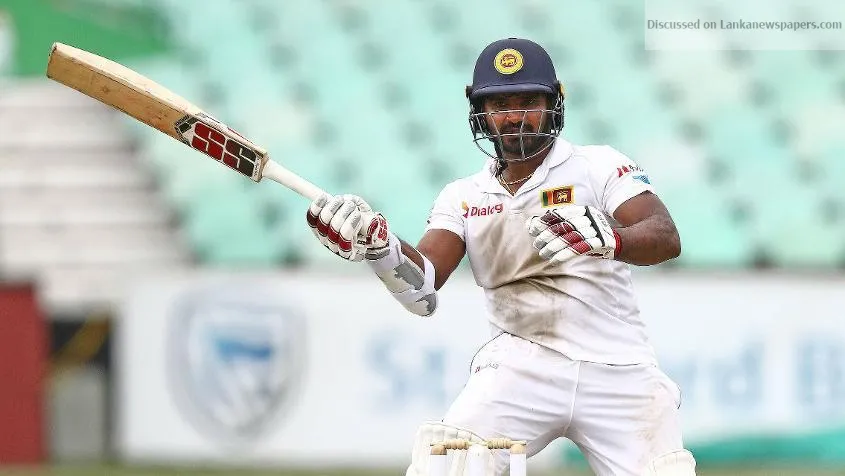
If dashing opener Kusal Janith Perera (KJP) was born in to the Red Indian clan, his name would probably be ‘Spirited Fighter’. To confer KJP with that nickname or ‘title’ there are reasons beyond just one. If KJP had opted to bow down to the ban imposed by the International Cricket Council (ICC) in December 2015, Sri Lanka’s wouldn’t have pulled off that dramatic Test win against South Africa in Durban few months ago, and beyond that he wouldn’t be travelling to England for the ICC Cricket World Cup 2019. But the spirited fighter he is known for, as a batsman, was given a new definition when KJP overcame critics and decided to stand on his feet to fight for his innocence, which took over five months to achieve. Recalling that moment when KJP was broken the news by the ICC of a ban, he stated it put him in a clueless position as to what went wrong and how it was possible, in the midst of a tour in New Zealand. “I was having dinner at a restaurant in New Zealand when I got a call from the ICC, asking to check my email. When I checked, it was a 40-page email from the ICC saying that I have taken steroids, and the worst was it said I have been immediately suspended. But I wasn’t sure why I was suspended, so I informed the coaching staff and even the physio, who asked me whether I took any medicine. I told them I had taken some treatment for a leach bite but nothing other than that. That was also done after taking permission from Sri Lanka Cricket (SLC). When you are suspended immediately, you can’t even enter a ground, so I was immediately sent home,” said KJP. Unlike taming the bowlers out in the middle, handling the new challenge was one of the greatest obstacles KJP had to face. For a sportsperson, the risk is high in violating the Anti-Doping rules, as even the food intakes could contain particles of banned substances. But in KJP’s case, he was charged by the ICC that the substance was injected into his body. “I knew I had not done anything wrong and I maintained that stance. But the ICC wanted me to accept it, so that they could go easy on the ban. But I refused because I cannot accept something that I have not done. So I contested. It was a long process with several examinations and meetings with lawyers. I went thrice to England to face three tests, which helped me prove my innocence scientifically. Following the results, I was waiting to go to Dubai for a hearing when I got the good news that the ICC had cleared me completely,” the aggressive southpaw recalling that moment, when he was given the second life in cricket, said. Ever since making his second comeback to cricket, KJP has grown stronger, by becoming an important component of the Sri Lanka cricket team. Having broken into cricket, as a middle-order batsman against Australia in an ODI at the Gabba in January 2012, he has now been named in the Sri Lanka World Cup squad, as a wicketkeeper and opening batsman. This justifies his struggle to get his name off the list of banned cricketers. His struggle during the ban, of five months, as KJP stated, was one of the toughest times in his life. “I was extremely busy, there was virtually no time even to hold a bat. It was a huge stressed-out period. I couldn’t listen to news or watch TV, because my name came up more often, than not. There were lots who criticised me and of course there were some who trusted in me. To be honest it was a very tough period in my life. It was a real battle. I had to attend meeting after meeting. There were several people who supported me wholeheartedly. This really helped me move on, because I knew I was not guilty.” Instead of his usual timeouts with the team mates and the coaching staff, off and on the field, KJP spent most of his time with his team of lawyers during the five month sabbatical period from the cricket field. The getaway process to freedom was not an easy one for KJP, who had to find out his food intakes during that period and other requirements according to the necessity of the tests. “It was a hellish process. I never thought they would clear me but I knew I have not done anything wrong. So I had that belief in me and I challenged the adverse findings on that basis,” KJP, who was not willing to concede four valuable years of good cricket, added. “I never wanted to give up at any point, but I knew if they banned me for four years, it would be really hard for me to come back to the national side again. If I am not mistaken, I was among the top five batsmen in T20 cricket at that time. I was the Man of the Series in the last series before I got suspended. So it was a huge loss to me but it was beyond my control. But I was very happy that I maintained my stance right from the beginning and proved my innocence. I may be the first one to do so,” taking a bit of pride for his worthy struggle, KJP went on to say. The powerful left-hand opener, who is inspired by his cricketing hero, Sanath Jayasuriya, not only emulates the batting legend’s technique, but is also a replica in all aspects. What differs KJP and Jayasuriya is only the hairdo. As a youngster, KJP had the same passion for Jayasuriya as millions of other Sri Lankans. But this youngster was too passionate that he even changed his batting stance because of his hero. “Lots of people say my shots are similar to those of Sanath Jayasuirya, but I can tell for sure, nothing is done purposely. You can never replicate what Sanath Jayasuriya did in the middle. It should come to you naturally. All those shots are impromptus,” KJP, the reborn version of Sanath Jayasuriya, clarified. Dwelling further on the similarities and disparities of the two explosive left-handed openers, the younger version of the two, KJP, explained how hard it is to become even closer to the legendary cricketer from Down South. “Sanath Jayasuirya is a legend. It’s not easy to do what he has done. The advice he has given me is to play my natural game. Just like him, I am not a technically correct batsman but we play with our arms and eyes. We throw the bat at what we see with great power. Our feet movements are slower than most other batsmen but our hand-eye coordination is very quick and faster than others. So what he told me was to play to my strength. You can follow his techniques during practices, but should play according to your instinct at a game”. Jayasuriya’s exact replica, or the legend’s younger ghost, haunted Kingsmead in Durban, in the first Test between South Africa and Sri Lanka, played during February 13 to 17. South Africa, batting first made 235 and confined Sri Lanka at 191 in the first innings. The Proteas posted 259 in the second innings, leaving Sri Lanka a target of 304, which looked achievable, before reeling at 215-8. Sri Lanka needed 89 runs with just the wickets of the two tailenders, but at the other end was KJP, looking totally natural, yet unsuspectingly brutal. What eventually happened is a known fact and the outcome even shocked the fully-fledged South African pace attack, a dramatic 1-wicket win. “It was like a dream. I had the start in the first innings but I think I threw my wicket away after laying a solid foundation and that helped South Africa get a first innings lead. To be honest, I never thought we would win the match batting with the tail against such a quality bowling attack. My intention was to retain the strike as much as possible without exposing the tail. Even the coach told me that I can’t play by trying to save the tail,” looking back at his heroic knock of 153 not out off 200 deliveries, KJP humbly recalled. Sri Lanka was pushed to the corner at 226-9 and a defeat was on the horizon for the visitors, until KJP held on to an end with tailender Vishwa Fernando in the other end. KJP took a step at a time, while exposing Fernando to the bowling attack of South Africa, until the unthinkable occurred. “When the runs required was less than 50, I knew if I hit a few shots to the ropes, we could win the match. This is when I thought I will go for the kill. I had to trust my partner, there was no other option. I knew all what they needed was one ball to win but all I wanted was to keep the scoreboard ticking to make it as close as possible. Luckily for me they got the new ball and I was batting at the end where the boundaries were close. I was able to play those shots that I wanted to play. I never knew it was such a great inning until later,” the Player of the Match in Durban, stated. KJP is certain that, an innings of that nature and a dramatic win such as that does not come everyday. He was quite taken aback at the fact that he was able to spearhead a remarkable victory, notably at a time when Sri Lanka was not in great shape. With the win in Durban, players started to believe in themselves and this motivated the Sri Lanka side to sweep the two-match Test series against South Africa. But KJP strongly believes that he is a weapon designed for the shorter version of cricket. “I like all three formats but my style suits Limited Over cricket as I am aggressive in batting. That’ doesn’t mean I don’t like red ball cricket,” the self-learning cricketer said. One of the biggest concerns KJP has is his batting average. His average in Tests is 35 while in ODIs and T20s they are slightly above 29. But the times that he has been forced off the field, due to injuries and of a doping ban, in some way, contributed to his current averages. “I am not happy with my average and I realised this pretty late. I used to make 50s and 60s and throw my wicket away. This took a little time to understand. When I reflect, I know I have wasted a lot of opportunities. But it takes a little time to understand this. Yes, injuries and the doping ban played a major role as I lost many months of cricket. All I want now is to play without injuries for at least a couple of years,” a serious KJP, who is highly concerned about his future, went on to say. KJP is clearly aware that, unlike in Tests, ODIs do not give cricketers a second chance. He looks forward to transform himself into a reliable batsman in the Sri Lankan unit, as his seniors Mahela Jayawardene, Kumar Sangakkara and TM Dilshan, who performed their duties by consolidating the batting lineup. “If you look at the record during the last few years, batsmen, including me, have failed to score runs and this has been our biggest problem. The duty of the batsmen is to set a target for the bowlers to execute their plans and win the match. We usually play in batting friendly conditions and we need to put up a good score to win a match. First thing is we must understand, we have failed as a batting unit during the last two years and this why we are in this situation at present.” “I don’t think we should transfer the blame to anyone, we need to score runs. If you take a match, only two or three players will score in a match. There can be eight batsman playing but the contribution will come from three players. But whoever scores runs, must remember to finish off things well, score big runs complimenting those who failed to score as well. This is what Kumar, Mahela and Dilshan did in the past,” speaking on his experience as a world renowned batsman, KJP said. As much as a radical change in the Sri Lanka cricket unit is anticipated, KJP too is eager to stabilise his position further as a dominant batsman on the global stage. KJP is of the view that Sri Lanka is a side with an abundance of skills, but are a self underrated lot, due to unknown reasons. The day the players begin to understand their value, KJP says, that is when there will be a change. “I think you need at least 60 percent of experienced players in the side. But unfortunately we did not have this over the last several years and I see this as the biggest draw back in our cricket. With that in mind, and with the past track record, I don’t think anyone will give us a chance at the World Cup. But we have defied the odds in the past and if we can keep our heads straight and play with intent, I am sure we can do something special,” KJP strongly believes in a possible Sri Lanka comeback at the ICC World Cup. “No one gave us a chance in Durban but we did it because a few players took the responsibility and all what we need is that in the ODI format. It’s better to be underdogs in the World Cup. We have nothing to lose but everything to gain. We can start doing that now.” one of the potential top performers at the upcoming world event, confidently stated.




